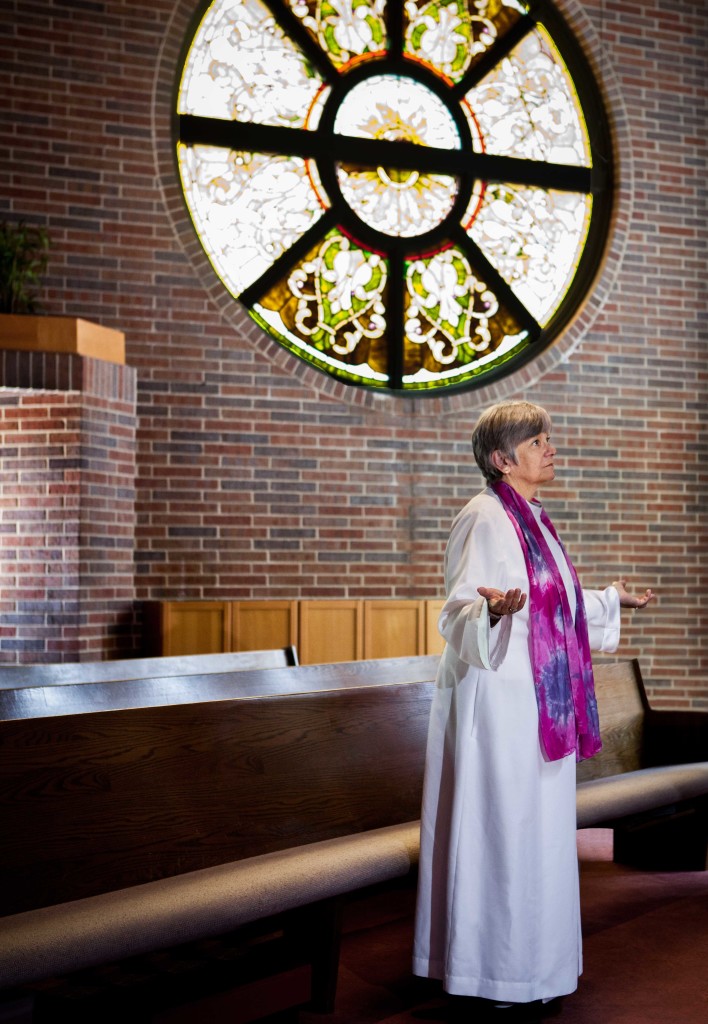Rebels with a Cause
Female Roman Catholic priests fight for equality.
For years women have fought injustice, obtaining the right to vote and earning their rightful place in the hierarchy of the business world. But there’s one sector where women continue to be discriminated against – the Roman Catholic Church.
The Catholic Church’s Canon law 1024 states that only baptized men can receive ‘holy orders’ and become priests. “It’s bigger than a justice issue,” insists Joan Houk, bishop of the Great Waters region of Roman Catholic Womenpriests, a 501(c)3 non-profit that promotes/supports the ordination of women and men in a renewed priestly ministry in the Roman Catholic Church. “When the Church says they can’t ordain women and we can’t embody the image of Christ, they’re saying there’s something wrong with women; we’re not equal to men.”
But a ‘loophole’ in the ordination process was discovered 13 years ago when a European bishop ordained the first women priests, in secret, on the Danube River. Now women are ordained in full apostolic succession, meaning they are ordained priests by female bishops who had been ordained by a male bishop. “That male bishop is in good standing with the Vatican so his name is kept secret,” explains Bishop Houk. “If the Vatican found out, they might excommunicate him.” Barbara Zeman – the first woman ordained a priest in Chicago – adds, “We don’t know for sure that [male priests ordaining women] would be excommunicated if they were caught breaking the law. More than likely they’d be slapped on the hand, because they’re bishops…they’re men. Punishment might be house arrest in the Vatican confines for the rest of their lives.”
Today there are over 145 female priests worldwide who are reshaping the church for the 21st century, including Bishop Houk and Reverend Zeman, who are members of the Roman Catholic Womenpriests organization.
 THE ROAD TO PRIESTHOOD
THE ROAD TO PRIESTHOOD
Bishop Houk calls herself a ‘Cradle Catholic,’ as she was baptized in the Church as a baby. “I went to Catholic school almost all my life, even in college. When I married and had children, I got involved with the catechetical program at my parish and became a Confraternity of Christian Doctrine (CCD) teacher.”
Her husband’s work took the family all over the country, where Bishop Houk studied elementary education, religious education and conflict management at a number of universities. “I then taught CCD at another parish and was eventually hired as the director of religious education,” she says. “When our pastor was away, I filled in…people called on me for their pastoral/spiritual needs even though I was a layperson. Eventually, I ended up going to Notre Dame with the intention of becoming a parish priest when the Church opened up ordination to women. But after we found that loophole, I was ordained in Pittsburgh in 2006. That was key for me. I will not leave the Roman Catholic Church.”
Reverend Zeman adds, “That’s part of the concern the Vatican hierarchy has; they’re afraid of us because they know we’ve found a loophole and consider our ordinations valid but illicit. The Vatican can yell, ‘You’re excommunicated!’ all they want. But first of all, that’s an archaic word; second, you’re not excommunicated unless you accept that excommunication. And I’m Catholic to the core.”
Growing up Catholic, Reverend Zeman wasn’t even aware of other religions besides Judaism. “I lived in a neighborhood that was more Jewish than Catholic. My only experience in public school was kindergarten, and I was pretty much in the minority because most kids were Jewish.”
Fast-forward to college, where Reverend Zeman earned a liberal arts degree from the University of Detroit Mercy and a masters in theology from Loyola University. “I was then ordained in 2008 – the first woman ordained in Chicago – at Saint Paul’s United Church of Christ.” And while some people argue against women priests, saying these ladies could ‘just be nuns,’ Reverend Zeman explains why that’s not a valid point. “Being a nun is very different than being a priest. I’ve always felt ‘the call’ in a way that leads me to want to minister to people and administer the sacraments.”
LIFE AS CLERGY
Reverend Zeman’s own church has excluded her, but that hasn’t stopped her from preaching. “I’ve found that other denominations accept the fact that I’m clergy and are very welcoming. Saint Paul’s United Church of Christ was the first to come and say, ‘Sure, we’ll entertain your ordination.’” And today, she shares a space with the Broadway United Methodist Church and also presides over masses for Dignity Chicago – a membership organization that was built to answer the need of gay, lesbian and transgender Catholics.
“They felt marginalized in the Catholic Church when bishops said they couldn’t live that way and practice Catholicism at the same time. You have to do one or the other…if you’re a practicing gay, lesbian, transgender person, you’re living in sin. So the answer to that, over 40 years ago, was to form our own community so we can worship in a way that won’t marginalize anyone – gay, straight, woman, man.” Bishop Houk agrees, “When you have an unjust law you have to break it,” she insists. “It’s a last resort, but you break it.”
Another rule that these women have ‘broken’ is the celibacy law, as priests are to never to marry nor have children. Both women have married and Bishop Houk has six children. “Yet, there’s a loophole for men who were ordained in the Episcopal or Lutheran faith and came into the Catholic Church already married with families,” says Bishop Houk of this double standard. “I actually believe that, one day, the Catholic Church will change the celibacy law, then allow priests to marry and finally accept women as priests.”
Until the Vatican recognizes the validity of women priests, Bishop Houk continues to practice her faith as an ordained bishop, overseeing the other women priests throughout the 10 states in her region, which includes Illinois. “We’re not a sample of the general population. We’re strong, independent women who come from different backgrounds with different experiences. It’s difficult for some to take the first step, but the more that join the group and the bigger it gets, the easier it is for the others until finally you get this critical mass and everyone will say, ‘They’re right…and this is where we should be.’”
MEANS TO AN END
It all comes down to a mutual understanding – what many consider to be ‘the Catholic thing to do.’ Bishop Houk says, “I think we need the strong leadership of a pope who’s open to looking at the world as it is today and listening to the people, theologians and scripture scholars when they say there’s no theological reason, no scriptural reason not to have women priests.” But Reverend Zeman insists women priests “really don’t need a hierarchy that’s going to tell us what to do from afar. We have the advocate Holy Spirit residing inside of us. We haven’t moved ourselves away from being Catholic. We are at the center of Catholicism and remain good and faithful Catholics. But the Vatican’s refusal to dialogue and their exclusive practices are such that we feel they aren’t Catholic.”
Kristyna Archer Photograph

Leave a Reply